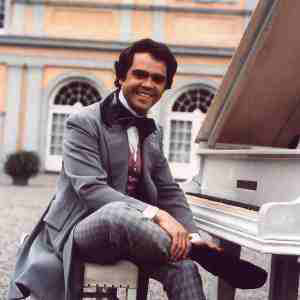
Eugen Cicero
Credit: http://t1.moskva.fm/
Leopold Godowsky: 53 Studies on Chopin Étude, No. 47 in G-Flat Major, Op. 10, No. 5 and Op. 25, No. 9, “Badinage”
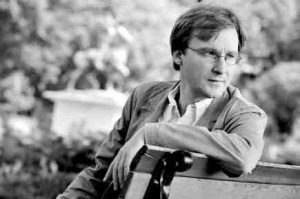
Franck Krawczyk
Credit: http://static.agendaculturel.fr/
Franck Krawczyk: Lacrimosa (after Chopin Étude in E-flat minor, Op. 10, No.6)
But Chopin is not all weeping and tears! Certainly not in the hands of the Romanian-German jazz pianist Eugen Cicero. He started his piano studies at age four, and publically played his first Mozart piano concerto with orchestra at age six! For one reason or another, Cicero did not pursue a career as a conventional concert pianist. Rather, he got interested in jazz and started to experiment with a musical style located halfway between the classical and the jazz idiom. He was soon dubbed “Mister Golden Hands,” and he produced over 70 recording over his career. His most popular disk was called “Swinging the Classics,” and it included an arrangement of Chopin’s Waltz Op. 64, No. 1.
Eugen Cicero: “Minute Waltz”
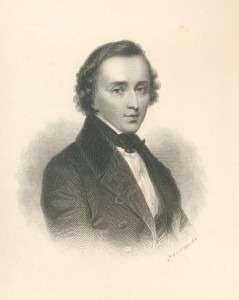 Chopin almost exclusively wrote music for the piano. He is the only iconic composer who did not write symphonies, operas or choral works, and only a handful of compositions involves other instruments. Among his nearly 200 compositions, we find 169 for solo piano. Yet surprisingly, the composer seems to have been in love with the sound of the guitar. According to a quote attributed to him, “nothing is more beautiful than a guitar,” he writes, “save perhaps two.” Taking Chopin by his word, the Spanish composer and classical guitarist Francisco Tárrega (1852-1909) enlarged his performing repertory by fashioning transcriptions of piano works by Beethoven, Mendelssohn and Chopin. Although Tárrega was not the first guitarist to transcribe works from other media to his own, he nevertheless managed thanks to Chopin, to elevate the guitar to the comparable status of the piano and violin in the concert hall.
Chopin almost exclusively wrote music for the piano. He is the only iconic composer who did not write symphonies, operas or choral works, and only a handful of compositions involves other instruments. Among his nearly 200 compositions, we find 169 for solo piano. Yet surprisingly, the composer seems to have been in love with the sound of the guitar. According to a quote attributed to him, “nothing is more beautiful than a guitar,” he writes, “save perhaps two.” Taking Chopin by his word, the Spanish composer and classical guitarist Francisco Tárrega (1852-1909) enlarged his performing repertory by fashioning transcriptions of piano works by Beethoven, Mendelssohn and Chopin. Although Tárrega was not the first guitarist to transcribe works from other media to his own, he nevertheless managed thanks to Chopin, to elevate the guitar to the comparable status of the piano and violin in the concert hall.
Fryderyk Chopin: Mazurka Op. 33, No. 4 (arr. Tárrega)
Chopin’s music prominently features in the repertory of the greatest classical pianists. But what’s more, these pianists frequently like to play their own Chopin arrangements as encores. Please join us next time for some musical fireworks a la Chopin.

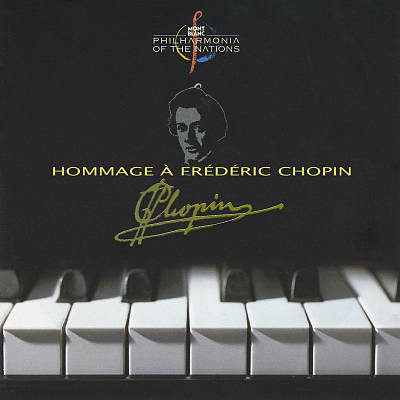
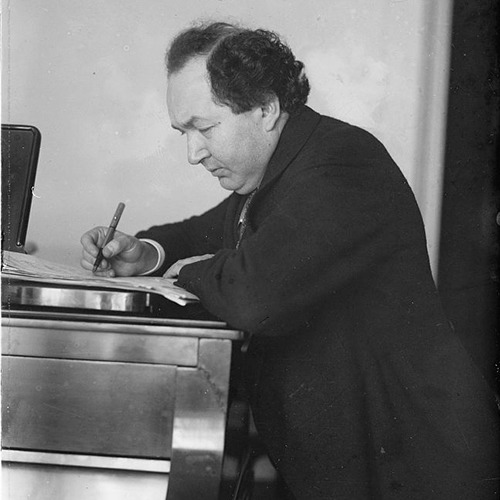
Very inspiring ….
I wrote to ask Dr Predota for the source of his quote, attributed to Chopin, that ““Nothing is more beautiful than a guitar, save perhaps two”. After a period while my question was being moderated, it disappeared and I received no answer. I have searched for the origin of this quote without success, hence my question to Dr Predota. Would someone please clarify what the policy of this website is with regard to serious comments/questions? With thanks.
The quote is attributed to Chopin.
Thanks
So where does this quote come from? What’s the original source?
The original source of this quote attributed to Chopin is unknown. It might have originated in an English publication during the 1940s, but details are not known to me.
GP